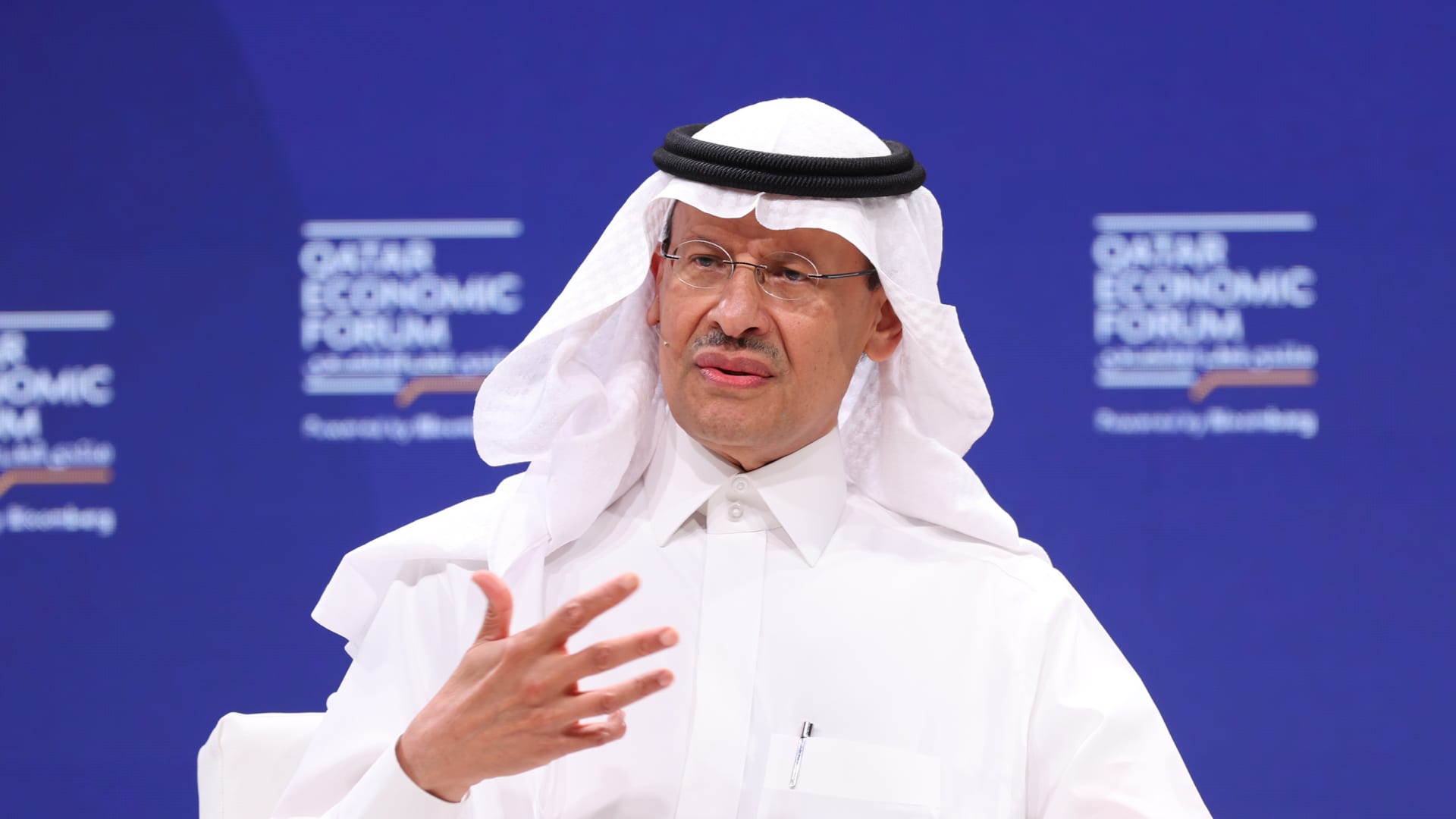Saudi Arabia’s Energy Minister Abdulaziz bin Salman speaks during a Qatar Economic Forum panel meeting in Doha, Qatar, May 23, 2023.
Bloomberg | Bloomberg | Getty Images
Saudi oil minister Prince Abdulaziz bin Salman told market speculators on Tuesday to be “careful,” repeating his warning that they could face future pain.
“The speculators, like in any market, they’re here to stay. I’ve been suggesting they’re going to complain. They did in April. I don’t need to show my cards, I’m not (a) a poker player(… . ) But I just want to tell them, be careful,” he told an energy panel at the Qatar Economic Forum in Doha.
The Saudi oil minister had previously slammed oil price speculators for wanting to profit by forecasting output from OPEC+, which is due to hold its next meeting on June 4.
Recently, several members of the OPEC+ alliance voluntarily — and independently of the group’s broader strategy — announced that they would cut crude oil production by 1.6 million barrels per day. The move briefly boosted prices, which have since pared gains. As of 12:05 pm London time, the price of Ice Brent crude oil futures expiring in July rose 50 cents to $76.49 a barrel from its May 22 settlement price.
Given concerns about global consumption, OPEC+, a group of 23 oil producers chaired by Saudi Arabia, decided in October to cut output by 2 million barrels per day to boost prices. The move was met with an immediate backlash in the United States because of the pressure it would cause on gas-guzzling families.
“As OPEC+, we were blamed both in October and in April. Who has the right numbers? I would say who measured the situation in a more responsible way, but in a more focused way?” Abdulaziz said on Tuesday.
“I think over the last six or seven months we’ve proven to be a responsible regulator,” he added, noting that markets are experiencing continued volatility that requires OPEC+ to remain proactive and pre-emptive.
Crude oil prices have been subdued in the weeks since the voluntary production cuts were announced in April, amid banking turmoil, recession signals, a slower-than-expected reopening of Beijing and a subsequent rise in demand from China, the world’s largest crude importer.
Market watchers are now questioning whether OPEC+ will cut production again in June to support prices, even though the Paris-based watchdog IEA now sees a serious supply crunch looming.
“Current market pessimism … contrasts sharply with our projected tightening of the market balance in the second half of the year, when demand is expected to exceed supply by nearly 2 mb/d,” the IEA said in its latest oil market report in May Report.
Still, the possibility — if unlikely — of a U.S. debt default could trigger lower oil demand and prices, Fatih Birol, the group’s executive director, told CNBC on Sunday.
In a May 17 note, analysts at Swiss bank UBS slashed their forecast for Brent crude prices by $10 a barrel to $95 a barrel by the end of the year, as crude production higher than expected and fears of a recession. They expect the market to supply nearly 1.5 million barrels per day in June.
“With several OPEC+ members voluntarily withdrawing oil from the market, and amid increased demand in the northern hemisphere summer, we expect a significant drawdown in inventories and bring investors back into the oil market,” they said.
Saudi Arabia’s oil minister also on Tuesday highlighted the risk of market uncertainty and the gradual drying up of spare capacity in producing countries – an argument he has previously used to advocate for increased spending on fossil fuels in addition to spending on renewable energy projects. fuel investment.
“Look at where we are now: Energy security is being constrained and capacity is being depleted because countries are not investing in oil and gas at the same time,” he said.
“We have a very interesting demand trajectory. So if you’re a hedger like us, we’re going to have to act to guard against any possibility of further volatility (…) but we’re frankly accepting that challenges, and we will continue to meet them.”


